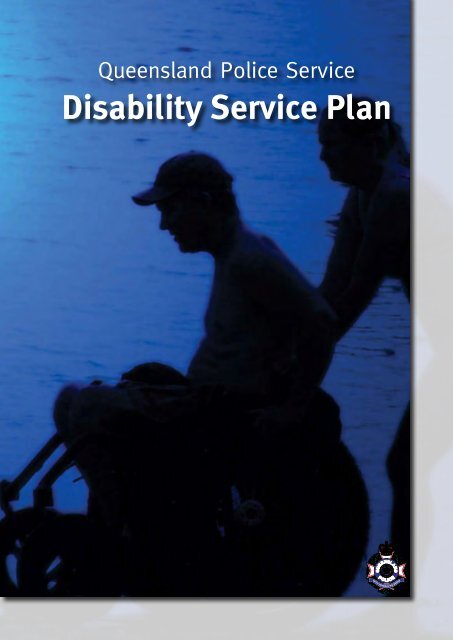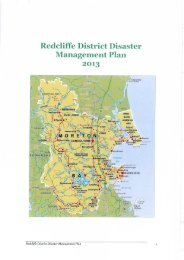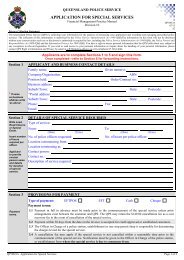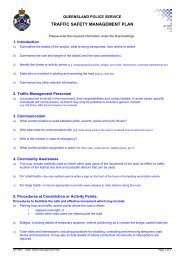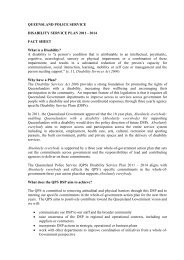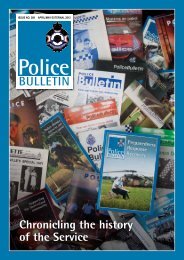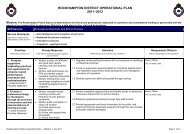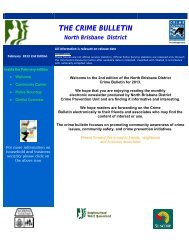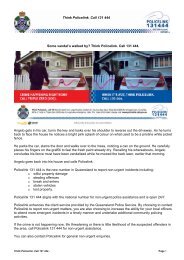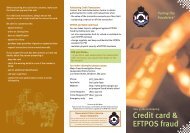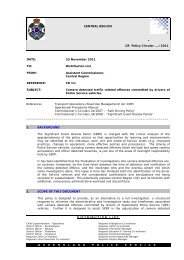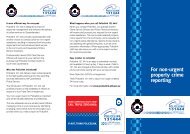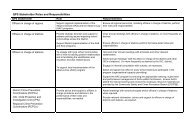Queensland Police Service Disability Service Plan
Queensland Police Service Disability Service Plan
Queensland Police Service Disability Service Plan
You also want an ePaper? Increase the reach of your titles
YUMPU automatically turns print PDFs into web optimized ePapers that Google loves.
<strong>Queensland</strong> <strong>Police</strong> <strong>Service</strong><br />
<strong>Disability</strong> <strong>Service</strong> <strong>Plan</strong>
TABLE OF CONTENTS<br />
FOREWORD . . . . . . . . . . . . . . . . . . . . . . . . . . . . . . . . . . . . . . . . . . . . . . . . . . . 2<br />
SCOPE. . . . . . . . . . . . . . . . . . . . . . . . . . . . . . . . . . . . . . . . . . . . . . . . . . . . . . . 3<br />
1. Introduction . . . . . . . . . . . . . . . . . . . . . . . . . . . . . . . . . . . . . . . . . . . . . . . 3<br />
2. Policy Statement. . . . . . . . . . . . . . . . . . . . . . . . . . . . . . . . . . . . . . . . . . . . 3<br />
3. Overview of the Core Business and Functions of the Department. . . . . . . . . . 3<br />
4. Data Profile.. . . . . . . . . . . . . . . . . . . . . . . . . . . . . . . . . . . . . . . . . . . . . . . 4<br />
4.1 <strong>Service</strong> Users Profile . . . . . . . . . . . . . . . . . . . . . . . . . . . . . . . . . . . . . 4<br />
4.2 Member Profile. . . . . . . . . . . . . . . . . . . . . . . . . . . . . . . . . . . . . . . . . 6<br />
5. Methodology. . . . . . . . . . . . . . . . . . . . . . . . . . . . . . . . . . . . . . . . . . . . . . . 6<br />
6. Communication Strategies . . . . . . . . . . . . . . . . . . . . . . . . . . . . . . . . . . . . . 6<br />
7. Monitoring and Evaluating Process . . . . . . . . . . . . . . . . . . . . . . . . . . . . . . . 7<br />
8. Review. . . . . . . . . . . . . . . . . . . . . . . . . . . . . . . . . . . . . . . . . . . . . . . . . . . 7<br />
STRATEGIES, ACTIONS AND PERFORMANCE INDICATORS. . . . . . . . . . . . . . . . . . . . 7<br />
PRIORITY ACTION AREAS. . . . . . . . . . . . . . . . . . . . . . . . . . . . . . . . . . . . . . . . . . 19<br />
<strong>Queensland</strong> <strong>Police</strong> <strong>Service</strong> - <strong>Disability</strong> <strong>Service</strong> <strong>Plan</strong>
FOREWORD<br />
The <strong>Disability</strong> <strong>Service</strong>s Act 2006 was passed by the <strong>Queensland</strong> Parliament on March 29, 2006. It<br />
provides a strong foundation for promoting the rights of people with a disability, increasing their<br />
wellbeing and encouraging their participation in an equitable community. It includes measures to<br />
safeguard the rights and safety of people with a disability and encourages service providers to<br />
consider the needs of people with a disability when they design and deliver services.<br />
The <strong>Queensland</strong> <strong>Police</strong> <strong>Service</strong> (QPS) supports the new legislation, which requires every <strong>Queensland</strong><br />
Government department to develop a <strong>Disability</strong> <strong>Service</strong> <strong>Plan</strong> to identify and address issues regarding<br />
service delivery to people with a disability.<br />
The QPS recognises the significant contribution that all members bring to the organisation through<br />
their skills, experiences, perspectives and knowledge. As an employer, the QPS acknowledges the<br />
right of people with disabilities to enter and participate in an equitable workplace.<br />
The <strong>Disability</strong> <strong>Service</strong> <strong>Plan</strong> provides further guidelines for the development, and improvement of services<br />
that are responsive to the needs of clients and members with a disability and their families and carers.<br />
This <strong>Disability</strong> <strong>Service</strong> <strong>Plan</strong> has been developed through internal and external consultation and<br />
clearly identifies our continued commitment to provide a high standard of policing services for the<br />
whole of the <strong>Queensland</strong> community.<br />
Bob Atkinson<br />
Commissioner<br />
<br />
<strong>Queensland</strong> <strong>Police</strong> <strong>Service</strong> - <strong>Disability</strong> <strong>Service</strong> <strong>Plan</strong>
SCOPE<br />
1. Introduction<br />
The <strong>Disability</strong> <strong>Service</strong> <strong>Plan</strong> describes what the QPS will do to ensure its clients and members with<br />
disabilities, their families and carers can access the services and facilities that are available to the<br />
broader community. The <strong>Disability</strong> <strong>Service</strong> <strong>Plan</strong> includes:<br />
• a policy statement about the QPS’s commitment to addressing the issue of access for people with<br />
disabilities, their families and carers<br />
• a profile of service users who will benefit from the plan<br />
• a description of the methods used to develop the plan<br />
• information about how the plan is communicated to people with disabilities, their families and<br />
carers<br />
• the method of reviewing, monitoring and evaluating the plan<br />
• the method of measuring the progress of the plan<br />
• the schedule for updating the plan<br />
• a description of priority areas for action.<br />
2. Policy Statement<br />
The QPS acknowledges the rights of people with a disability; supports their inclusion in the activities<br />
of the organisation; recognises the value of their contribution to its performance; and will ensure<br />
services are accessible, safe, accountable and responsive to the needs of people with a disability and<br />
their families and carers. The QPS is committed to removing barriers for people with a disability and<br />
their families and carers and in doing so, integrating the principles of the <strong>Disability</strong> <strong>Service</strong>s Act 2006.<br />
3. Overview of the Core Business and Functions of<br />
the Department<br />
The Mission of the QPS is to serve the people of<br />
<strong>Queensland</strong> by protecting life and property, preserving<br />
peace and safety, preventing crime and upholding the<br />
law in a manner which has regard for the public good<br />
and the rights of the individual.<br />
The services that we provide are best classified by our<br />
strategic outputs stated within the QPS Strategic <strong>Plan</strong><br />
2004-2008. These are:<br />
• Community Safety and Engagement<br />
• Crime Management<br />
• Traffic Management<br />
• Professional Standards and Ethical Practice<br />
• Corporate Resource Management, to support the above services.<br />
<strong>Queensland</strong> <strong>Police</strong> <strong>Service</strong> - <strong>Disability</strong> <strong>Service</strong> <strong>Plan</strong>
Community Safety and Engagement<br />
These are our services to prevent crime, engage the community and preserve personal and public<br />
safety and good order during civil emergencies and special events. Preventing crime by addressing<br />
its causes contributes to safe and secure communities.<br />
Crime Management<br />
These are our services to detect offenders, conduct preliminary investigations and commence<br />
prosecutions. Relevant activities include initial police response to general crime and calls for<br />
assistance from members of the public, and crime operations conducted throughout the State by<br />
specialist officers targeting large-scale offences.<br />
Traffic Management<br />
These are our services to prevent or detect motorists committing traffic offences, including regulating<br />
and controlling traffic across the State with the aim of reducing the incidence of road trauma.<br />
Professional Standards and Ethical Practice<br />
These are our services to ensure the QPS is both professional and publicly accountable. Relevant<br />
activities include training of members, internal investigations, audit, risk management, strategic<br />
planning and review, and integrated policy development.<br />
These services are delivered 24 hours a day across a State covering more than 1.7 million square<br />
kilometres. To facilitate policing at a local level, the QPS is divided into eight geographical regions,<br />
three specialist commands and four corporate divisions. There are 29 operational police districts and<br />
more than 440 police stations and establishments throughout the State.<br />
The QPS is dedicated to improving services for members and clients with a disability and is prepared<br />
to meet the challenges of providing the appropriate services and infrastructure to support clients and<br />
members with a disability throughout the State.<br />
4. Data Profile<br />
4.1 <strong>Service</strong> Users Profile<br />
QPS clients include:<br />
• <strong>Queensland</strong> residents and visitors<br />
• victims of crime<br />
• anyone requesting police assistance<br />
• suspects and people charged with committing<br />
offences.<br />
<br />
<strong>Queensland</strong> <strong>Police</strong> <strong>Service</strong> - <strong>Disability</strong> <strong>Service</strong> <strong>Plan</strong>
<strong>Queensland</strong> Community<br />
<strong>Queensland</strong> has almost four million<br />
residents and over seven million people<br />
visit the State each year. The population<br />
includes Aboriginal and Torres Strait Islander<br />
people and people from 120 diverse ethnic<br />
backgrounds. The distribution of these<br />
communities varies greatly across the State.<br />
According to the 2003 Australian Bureau of Statistic’ Survey of <strong>Disability</strong>, Aging and Carers, 834,000<br />
people living in <strong>Queensland</strong> had a reported disability. This constitutes approximately 22% of<br />
<strong>Queensland</strong>’s total population. Most disabilities resulted from physical conditions (approx. 692,000)<br />
with the remainder resulting from mental and behavioural disorders (approx. 142,000). Approximately<br />
62% of people with a disability require assistance to manage their ‘health condition’ or to cope<br />
with everyday activities of life. Partners, parents, children and friends are the major providers of<br />
assistance (Australian Bureau of Statistics (ABS) (2004), <strong>Disability</strong> Aging and Carers: Summary of<br />
Findings 2003 State Tables for <strong>Queensland</strong>, Cat No 4430.0).<br />
A disability is a person’s condition that is attributable to an intellectual, psychiatric, cognitive,<br />
neurological, sensory or physical impairment; or a combination of these impairments; and results in a<br />
substantial reduction of the person’s capacity for communication, social interaction, learning, mobility<br />
or self care or management and the person needing support (Section 11 <strong>Disability</strong> <strong>Service</strong> Act 2006).<br />
Victims of crime<br />
Due to circumstance surrounding their disability, people with a disability may find themselves in<br />
a position of vulnerability. A victim is defined as a person who has suffered harm from a violation<br />
of the State’s criminal laws because a crime is committed that involves direct violence against<br />
the person; or because the person is a member of the immediate family of, or is a dependant of,<br />
a victim; or because the person has directly suffered harm in intervening to help another victim<br />
(Section 5 Criminal Offence Victims Act (1995)).<br />
Anyone can be victimised by crime. But people who have a disability can be more vulnerable to<br />
victimisation than others in the community. People with a mental disability may be less able to<br />
recognise and avoid danger, and people with a physical disability may be less able to protect<br />
themselves or escape harm. Furthermore, victims of crime who have a disability may be less able to<br />
contact the police or other support services and, without special assistance, help in the investigation<br />
of their victimization.<br />
Crime rates provide important indicators of policing performance, and are closely monitored by the<br />
QPS with an aim to reduce crime. In <strong>Queensland</strong> during 2005-2006 there were 33,288 reported<br />
offences against the person and 23,3300 offences against property. Approximately one out of five<br />
people in <strong>Queensland</strong> has a disability however the risk of criminal victimisation for people with a<br />
disability is higher than for people without disabilities. However, all victims of crime tend to face the<br />
same issues.<br />
<strong>Queensland</strong> <strong>Police</strong> <strong>Service</strong> - <strong>Disability</strong> <strong>Service</strong> <strong>Plan</strong>
The QPS seeks to ensure that victims of crime are assisted to overcome the effects of crime. The<br />
<strong>Service</strong> has a range of policies that afford victims fairness, dignity and access to justice. These<br />
policies are derived from the principles of the Criminal Offence Victims Act (1995). The way victims<br />
cope depends largely on their experience following the crime. Members of the QPS may be one of<br />
the first people to interact with victims. For this reason, members of the <strong>Service</strong> are in a unique<br />
position to help victims cope with the trauma of the crime and restore a sense of security and<br />
control over their lives.<br />
4.2 Member Profile<br />
The QPS has a membership of over 13,000 people. More than 9,300 are police officers, supported<br />
by over 3,800 un-sworn staff members who provide administrative and specialist support to<br />
policing operations. Of this number, more than 500 people report having one or more disabilities<br />
representing over 4% of the total QPS membership. Sensory and physical disabilities are the most<br />
reported disability. (Note: these statistics are derived from reported disabilities only and those<br />
reported may or may not correspond with the definition of a disability within the <strong>Disability</strong> <strong>Service</strong><br />
Act 2006).<br />
5. Methodology<br />
The QPS has a well established practice of internal and external consultation. It is committed to<br />
consulting with people with disabilities, their families and carers and where required, disability<br />
organisations, to ensure that services are provided appropriately.<br />
The QPS has consulted with the Reference Group advising the Chief Executive Officers’ Sub-committee<br />
on <strong>Disability</strong> (the CEO Sub-committee) and other external stakeholders regarding development of the<br />
<strong>Disability</strong> <strong>Service</strong> <strong>Plan</strong>.<br />
Input from relevant internal parties has been sought, including the People with Disabilities Support<br />
Network, Human Resource Policy and Workforce <strong>Plan</strong>ning Section, Equity and Diversity Unit, Cultural<br />
Advisory Unit, Human Resource Development Branch, Information Management Division, Property and<br />
Facilities Branch and Policing Advancement Branch.<br />
The <strong>Disability</strong> <strong>Service</strong>s <strong>Plan</strong> was endorsed by the CEO .<br />
Sub-committee and implementation commenced from .<br />
July 2007.<br />
During the life of the <strong>Plan</strong>, the QPS is committed to a process<br />
of ongoing internal and external consultation and review.<br />
6. Communication Strategies<br />
The <strong>Disability</strong> <strong>Service</strong> <strong>Plan</strong> will be published on the QPS<br />
intranet and internet sites for the information of QPS members<br />
and the community. It has been disseminated through Regions<br />
<br />
<strong>Queensland</strong> <strong>Police</strong> <strong>Service</strong> - <strong>Disability</strong> <strong>Service</strong> <strong>Plan</strong>
and Commands for the general information of QPS members. The QPS will correspond with internal<br />
and external stakeholders regarding progress towards achievement of .<br />
the <strong>Plan</strong>.<br />
7. Monitoring and Evaluation Process<br />
The QPS is committed to monitoring and reporting<br />
on its performance and accordingly the <strong>Disability</strong><br />
<strong>Service</strong> <strong>Plan</strong> is subject to review and evaluation. The<br />
<strong>Disability</strong> <strong>Service</strong> <strong>Plan</strong> is intended to be dynamic and<br />
will periodically be reviewed to ensure it remains<br />
relevant and responsive to the needs of people with<br />
a disability, their families and carers, and consistent<br />
with the principles of the <strong>Disability</strong> <strong>Service</strong>s Act 2006.<br />
This will be achieved by:<br />
• monitoring the QPS progress on the priority areas<br />
for action<br />
• reporting annually on the QPS progress on the<br />
priority areas for action<br />
• reviewing the <strong>Plan</strong> every three years.<br />
Achievements against the progress measures will be included in the <strong>Service</strong>’s Annual Reports<br />
commencing in 2007-2008 and a report addressing an evaluation framework will be submitted to<br />
<strong>Disability</strong> <strong>Service</strong>s <strong>Queensland</strong> (DSQ). The <strong>Disability</strong> <strong>Service</strong> <strong>Plan</strong> will be modified accordingly, and as<br />
new areas for action are identified.<br />
As the <strong>Disability</strong> <strong>Service</strong>s <strong>Plan</strong> is modified, updated versions will be published on the QPS intranet<br />
and internet sites for the information of QPS members and the community.<br />
8. Review<br />
The <strong>Disability</strong> <strong>Service</strong> <strong>Plan</strong> is subject to review and evaluation. The QPS will evaluate its<br />
achievements against performance indicators and include the results in the <strong>Service</strong>’s Annual Report.<br />
Where required, the <strong>Disability</strong> <strong>Service</strong>s <strong>Plan</strong> will be modified to accommodate priorities and needs.<br />
In addition, the QPS will conduct a comprehensive review of the <strong>Disability</strong> <strong>Service</strong> <strong>Plan</strong> every three<br />
years.<br />
STRATEGIES, ACTIONS AND PERFORMANCE INDICATORS<br />
The following strategies, actions and performance indicators provide a basis for translating the<br />
principles of the <strong>Disability</strong> <strong>Service</strong>s Act 2006 into tangible and achievable results:<br />
<strong>Queensland</strong> <strong>Police</strong> <strong>Service</strong> - <strong>Disability</strong> <strong>Service</strong> <strong>Plan</strong>
No. Commentary<br />
Link to DSQ<br />
Strategy No. Action Performance<br />
Indicators<br />
Timeframe Responsible<br />
Member/s<br />
Strategic<br />
Directions<br />
1 Improve QPS<br />
services to meet<br />
the needs of<br />
people with a<br />
disability, their<br />
families and<br />
carers.<br />
1.1<br />
Ascertain how<br />
people with a<br />
disability, their<br />
families and carers<br />
engage with the<br />
QPS.<br />
Opportunities for<br />
gathering information<br />
on how people with<br />
a disability, their<br />
families and carers<br />
engage with the QPS<br />
are identified.<br />
Potential initiatives<br />
for gathering<br />
information are<br />
implemented.<br />
Trends concerning<br />
how people with<br />
a disability, their<br />
families and carers<br />
engage with the QPS<br />
are identified.<br />
July 2008<br />
July 2009<br />
July 2010<br />
Director,<br />
Information<br />
Management<br />
Division/Assistant<br />
Commissioner,<br />
Information &<br />
Communications<br />
Technology<br />
To improve services there is a need to better understand how<br />
and why people with a disability, their families and carers<br />
engage with the QPS. Currently, people with a disability are<br />
not categorised on the Crime Reporting Information System for<br />
<strong>Police</strong> (CRISP). Therefore crime statistics for this community<br />
cohort are not available. However, people with a disability,<br />
their families and carers are likely to engage with the QPS in<br />
a variety of ways other than as victim or offender. Identifying<br />
opportunities for determining how people with a disability,<br />
their families and carers engage with the QPS may enable the<br />
organisation to tailor services for this community cohort.<br />
Strengthen<br />
access to generic<br />
services to PWD<br />
Improve<br />
accountability,<br />
performance<br />
reporting and<br />
quality<br />
Strengthen early<br />
intervention<br />
strategies<br />
(including<br />
specific<br />
strategies for<br />
children with a<br />
disability<br />
Potential initiatives<br />
for enhancing service<br />
for people with<br />
a disability, their<br />
families and carers<br />
are identified.<br />
July 2010<br />
All Commands,<br />
Divisions &<br />
Regions<br />
1.2<br />
Participate in<br />
projects or<br />
programs that<br />
seek to improve<br />
outcomes for<br />
people with a<br />
disability who<br />
engage with the<br />
criminal justice<br />
system.<br />
Opportunities<br />
to participate in<br />
projects or programs<br />
of potential interest<br />
are identified.<br />
The development of<br />
potential projects or<br />
programs of interest<br />
are supported where<br />
appropriate.<br />
Ongoing<br />
Director, Office of<br />
the Commissioner<br />
All Commands,<br />
Divisions &<br />
Regions<br />
The QPS is committed to providing equitable services to<br />
people with a disability, their families and carers and ensuring<br />
their wellbeing and safeguarding their rights.<br />
The QPS will work in partnership with individuals and groups<br />
within the disability sector to enable the service to respond<br />
effectively to any concern for the safety of people with a<br />
disability and support continuous improvement in the quality<br />
of services they receive within the criminal justice system.<br />
Strengthen<br />
across Govt<br />
linkages<br />
Strengthen<br />
across to generic<br />
services to PWD<br />
Strengthen early<br />
intervention<br />
strategies<br />
(including specific<br />
strategies for<br />
children with a<br />
disability<br />
<br />
<strong>Queensland</strong> <strong>Police</strong> <strong>Service</strong> - <strong>Disability</strong> <strong>Service</strong> <strong>Plan</strong>
No. Commentary<br />
Link to DSQ<br />
Strategy No. Action Performance<br />
Indicators<br />
Timeframe Responsible<br />
Member/s<br />
Strategic<br />
Directions<br />
1.3 Ensure policies<br />
and procedures<br />
comply with<br />
the disability<br />
policy statement,<br />
disability related<br />
legislation and<br />
other disability<br />
related mandates<br />
where required.<br />
Existing policies<br />
and procedures are<br />
amended where<br />
necessary.<br />
New policies and<br />
procedures are<br />
developed in<br />
compliance where<br />
necessary.<br />
Ongoing Assistant<br />
Commissioner,<br />
Operations<br />
Support Command<br />
Director, Human<br />
Resource Division<br />
It is a requirement of the <strong>Disability</strong> <strong>Service</strong> <strong>Plan</strong> Guidelines<br />
May 2006 (<strong>Disability</strong> <strong>Service</strong>s <strong>Queensland</strong>, 2006) that a policy<br />
statement is developed as part of the <strong>Disability</strong> <strong>Service</strong> <strong>Plan</strong>.<br />
The <strong>Disability</strong> <strong>Service</strong> <strong>Plan</strong> will be driven by a clear policy<br />
statement for people with a disability, their families and carers.<br />
A policy statement has been developed which highlights the<br />
organisation’s commitment to removing barriers for people<br />
with a disability, their family and carers and furthering the<br />
principles of the <strong>Disability</strong> <strong>Service</strong> Act 2006. The policy<br />
statement is contained within this document (refer p.4).<br />
Improve<br />
accountability,<br />
performance<br />
reporting and<br />
quality<br />
Strengthen<br />
access to generic<br />
services to PWD<br />
In order to ensure that the policy statement is known by QPS<br />
members, clients and stakeholders, it will be displayed in<br />
relevant documentation and other mediums.<br />
The QPS is subject to many legislative requirements and other<br />
mandates and has many policies and procedures which shape<br />
organisational services and practices.<br />
The QPS recognises that achieving equity for people with a<br />
disability, their families and carers may require the provision<br />
of specific services and practices. As existing policies and<br />
procedures are reviewed and new policies and procedures<br />
developed, they will take into account the need to achieve<br />
equity for people with a disability, their families and carers.<br />
<strong>Queensland</strong> <strong>Police</strong> <strong>Service</strong> - <strong>Disability</strong> <strong>Service</strong> <strong>Plan</strong>
No. Commentary<br />
Link to DSQ<br />
Strategy No. Action Performance<br />
Indicators<br />
Timeframe Responsible<br />
Member/s<br />
Strategic<br />
Directions<br />
1.4<br />
Conduct a<br />
workforce analysis<br />
with a focus on<br />
the employment<br />
of people with a<br />
disability.<br />
Employment trends<br />
for people with<br />
a disability are<br />
identified.<br />
Potential initiatives<br />
for enhancing<br />
employment<br />
opportunities are<br />
identified.<br />
Initiatives for<br />
enhancing<br />
employment<br />
opportunities are<br />
piloted.<br />
July 2008<br />
Director, Human<br />
Resource Division<br />
As an employer, the <strong>Service</strong> has an obligation to the<br />
principles of equal opportunity and diversity management.<br />
This obligation applies to all employees, gives the<br />
organisation increased credibility and improves performance<br />
and service delivery. Recruitment is informed by the Equal<br />
Opportunity in Public Employment Act 1992. The QPS Equal<br />
Employment and Opportunity Policy and Equal Employment<br />
Opportunity Management <strong>Plan</strong> 2006-2008 assist supervisors<br />
and managers in fulfilling their managerial responsibilities<br />
under the legislation. The QPS Reasonable Adjustment<br />
Policy will assist the <strong>Service</strong> to comply with human resource<br />
management practices in the employment of people with<br />
disabilities. It also assists managers and supervisors to meet<br />
their responsibilities under the Equal Opportunity in Public<br />
Employment Act 1992, the <strong>Queensland</strong> Anti Discrimination<br />
Act 1991 and the Commonwealth <strong>Disability</strong> Discrimination Act<br />
1992. Using indicators such as recruitment processes, initial<br />
employment, current strength, gender, disability, job design,<br />
career progression and training and development to analyse<br />
employment trends may assist in identifying a opportunities<br />
for enhancing employment prospects for people with a<br />
disability.<br />
Improve<br />
accountability,<br />
performance<br />
reporting and<br />
quality<br />
Strengthen<br />
individuals,<br />
families and<br />
carers<br />
1.5<br />
Establish a<br />
<strong>Disability</strong><br />
Reference Group.<br />
Reference Group<br />
members are<br />
identified.<br />
Terms of Reference<br />
are developed and<br />
agreed.<br />
July 2008<br />
Director, Office of<br />
the Commissioner<br />
The role of the <strong>Disability</strong> Reference Group will be to consider,<br />
provide advice and make recommendations on issues within<br />
the scope of the <strong>Disability</strong> <strong>Service</strong> <strong>Plan</strong>. Membership should<br />
include QPS members and external representatives.<br />
Improve<br />
accountability,<br />
performance<br />
reporting and<br />
quality<br />
Members service<br />
wide are informed of<br />
the Reference Group.<br />
10 <strong>Queensland</strong> <strong>Police</strong> <strong>Service</strong> - <strong>Disability</strong> <strong>Service</strong> <strong>Plan</strong>
No. Commentary<br />
Link to DSQ<br />
Strategy No. Action Performance<br />
Indicators<br />
Timeframe Responsible<br />
Member/s<br />
Strategic<br />
Directions<br />
1.6<br />
Put into operation<br />
the Protocol for<br />
the Coordination<br />
of Investigations<br />
into Allegation of<br />
Abuse, Neglect<br />
and Exploitation<br />
of People with a<br />
<strong>Disability</strong>.<br />
The Protocol is<br />
incorporated within<br />
the OPM.<br />
The appropriate<br />
members are<br />
provided training on<br />
the operation of the<br />
Protocol.<br />
Members service<br />
wide are informed of<br />
the Protocol.<br />
July 2008<br />
Assistant<br />
Commissioner,<br />
Operations<br />
Support Command<br />
The development of a protocol for the coordination of<br />
investigations into allegation of abuse, neglect and exploitation<br />
of people with a disability was decided by Cabinet on 30 May<br />
2005 (Decision No. 5728). A cross agency working group,<br />
including the QPS, was established to develop the protocol.<br />
The purpose of the protocol is to provide a mechanism for<br />
identifying the Government agency with lead responsibility for<br />
triggering an investigation into such allegations.<br />
The aim of the protocol is to ensure that any allegation of<br />
abuse, neglect and exploitation of a person with a disability<br />
is investigated appropriately and that immediate protective<br />
action is taken where necessary. The protocol was endorsed by<br />
Peter Beattie MP Premier of <strong>Queensland</strong> and became effective<br />
on 7 July 2006. In addition, Mr Beattie confirmed that the<br />
internal agency policies required to operationalise the protocol<br />
were to be progressed through the development of each<br />
agency’s <strong>Disability</strong> <strong>Service</strong> <strong>Plan</strong>, to commence on 1 July 2007.<br />
Improve<br />
accountability,<br />
performance<br />
reporting and<br />
quality<br />
Strengthen early<br />
intervention<br />
strategies<br />
(including<br />
specific<br />
strategies for<br />
children with a<br />
disability<br />
Strengthen<br />
across Govt<br />
linkages<br />
1.7<br />
Support the<br />
principles of<br />
the <strong>Queensland</strong><br />
Government Carer<br />
Recognition Policy<br />
and Carer Action<br />
<strong>Plan</strong> 2006-2010<br />
The Policy and Action<br />
<strong>Plan</strong> is incorporated<br />
within policies and<br />
procedures where<br />
appropriate.<br />
Members service<br />
wide are aware of<br />
the Policy and Action<br />
<strong>Plan</strong>.<br />
Identify initiatives<br />
that enhance support<br />
for carers.<br />
July 2008<br />
Director, Human<br />
Resource Division<br />
The <strong>Queensland</strong> Government is committed to working with<br />
communities to foster understanding of the carer role and<br />
generate more practical support for carers. In 2003 the <strong>Queensland</strong><br />
Government launched the <strong>Queensland</strong> Government Carer<br />
Recognition Policy to declare the Government’s commitment to<br />
recognising and supporting the role of carers in the community, in<br />
particular, to respect carers as individuals and as partners in care.<br />
The <strong>Queensland</strong> Government Carer Action <strong>Plan</strong> follows on from<br />
the recognition policy. It announces the practical steps the<br />
Government will take to implement the Carer Recognition Policy.<br />
It sets out how departments will work with carers as partners<br />
in care.<br />
Carers are defined by the <strong>Queensland</strong> Government Carer<br />
Recognition Policy as:…a person of any age, who without<br />
being paid, cares for another person who needs ongoing<br />
support because of a long-term medical condition, a mental<br />
illness, a disability, frailty or the need for palliative care. A<br />
carer may or may not be a family member and may or may<br />
not live with the person. Volunteers under the auspices of a<br />
voluntary organisation are not included.<br />
Strengthen<br />
across Govt<br />
linkages<br />
Strengthen<br />
individuals,<br />
families and<br />
carers<br />
<strong>Queensland</strong> <strong>Police</strong> <strong>Service</strong> - <strong>Disability</strong> <strong>Service</strong> <strong>Plan</strong> 11
No. Commentary<br />
Link to DSQ<br />
Strategy No. Action Performance<br />
Indicators<br />
Timeframe Responsible<br />
Member/s<br />
Strategic<br />
Directions<br />
Carers play a crucial and often unsung role in the lives of<br />
people with a disability. They make an immense contribution<br />
to the wellbeing of the people they look after. Recognising and<br />
supporting carers cannot be done in isolation from assisting<br />
the person for whom they are caring. There is a need to strike<br />
a balance between the carer and the person being cared for.<br />
Helping carers is one of the best ways of helping someone<br />
they are caring for.<br />
Although the QPS is not an agency responsible for the key<br />
initiatives set out in the Carer Action <strong>Plan</strong> it may be able to<br />
support the principles of the Policy and <strong>Plan</strong> by identifying<br />
opportunities for enhancing its policies, procedures and<br />
services that relate to carers within the QPS and the wider<br />
community.<br />
2<br />
Improve access<br />
to information<br />
about QPS<br />
services for<br />
people with a<br />
disability, their<br />
families and<br />
carers.<br />
2.1 Develop and<br />
implement<br />
a procedure<br />
for making<br />
information about<br />
services available<br />
in formats that<br />
satisfy the<br />
communication<br />
needs of people<br />
with a disability.<br />
The procedure is<br />
developed and<br />
approved.<br />
Members and<br />
disability related<br />
stakeholders are<br />
informed of the<br />
procedure.<br />
Information relating<br />
to the procedure<br />
is made available/<br />
accessible on the<br />
internal and/or<br />
external websites.<br />
July 2008 Director,<br />
Administration<br />
Division<br />
Providing <strong>Queensland</strong>ers with a disability with equitable<br />
access to information is an important priority for the state<br />
government. The right of people with a disability to access<br />
information is protected through the <strong>Queensland</strong> <strong>Disability</strong><br />
<strong>Service</strong>s Act 1992, part 3, section 9(2)(e), which states that<br />
people with a disability have the right to:<br />
• any necessary support, and access to information, to<br />
enable them to participate in decisions that affect their<br />
lives.<br />
These rights are strengthened and articulated in other<br />
<strong>Queensland</strong> legislation such as the Guardianship and<br />
Administration Act 2000 and the Anti-discrimination Act 1991.<br />
Improve<br />
accountability,<br />
performance<br />
reporting and<br />
quality<br />
Strengthen<br />
access to generic<br />
services to PWD<br />
12 <strong>Queensland</strong> <strong>Police</strong> <strong>Service</strong> - <strong>Disability</strong> <strong>Service</strong> <strong>Plan</strong>
No. Commentary<br />
Link to DSQ<br />
Strategy No. Action Performance<br />
Indicators<br />
Timeframe Responsible<br />
Member/s<br />
Strategic<br />
Directions<br />
The QPS is also bound by the provisions of the Freedom of<br />
Information Act (FOI Act). The Act supports the concept that the<br />
community should be kept informed of government operations<br />
in its dealings with the community. Members of the community<br />
have the right to apply for access to <strong>Service</strong> documents.<br />
Therefore the <strong>Service</strong> should provide necessary assistance to<br />
individuals requesting access to documents.<br />
The QPS is committed to making information about its services<br />
as widely accessible as possible, where appropriate and<br />
practicable. The QPS should therefore seek to enable ready<br />
access to information about its services and activities in a<br />
format and at a time and location, of a person’s choosing.<br />
Information needs to be delivered in many ways to suit the<br />
needs of people with a disability. The QPS should adopt an<br />
equitable but flexible approach to delivering this information.<br />
This approach should take into account those people who<br />
need the information and how they need it delivered. The<br />
outcome should be that people get the information they need<br />
in a manner that suits them.<br />
Developing procedures for making information on services<br />
available in formats that satisfy the needs of people with a<br />
disability supports this principle.<br />
3<br />
Improve<br />
opportunities<br />
for people with<br />
a disability,<br />
their families<br />
and carers to<br />
participate in<br />
consultation<br />
regarding QPS<br />
services.<br />
3.1 Enhance internal<br />
and external<br />
consultation<br />
processes to<br />
better enable<br />
people with a<br />
disability, their<br />
families and carers<br />
to participate in<br />
discussions and<br />
decisions relating<br />
to services.<br />
Evaluate existing<br />
consultation<br />
processes.<br />
Potential initiatives<br />
for enhancing<br />
consultation<br />
processes are<br />
identified.<br />
Consultation<br />
processes are<br />
implemented.<br />
July 2008<br />
July 2008<br />
July 2009<br />
All Commands,<br />
Divisions &<br />
Regions<br />
The QPS is committed to consulting the community about<br />
the type, quality and manner in which services are delivered.<br />
The QPS recognises that the consultation processes it uses<br />
must engage as many people as possible across the broad<br />
spectrum of <strong>Queensland</strong> communities. It is vital that all service<br />
consumers have equal opportunity and access to participate<br />
in consultation relating to services. Failure to provide that<br />
opportunity and access may result in inequity. Consultation<br />
should include internal representatives, Government and Non-<br />
Government organisations.<br />
Improve<br />
accountability,<br />
performance<br />
reporting and<br />
quality<br />
Strengthen<br />
access to generic<br />
services to PWD<br />
Strengthen<br />
across Govt<br />
linkages<br />
<strong>Queensland</strong> <strong>Police</strong> <strong>Service</strong> - <strong>Disability</strong> <strong>Service</strong> <strong>Plan</strong> 13
No. Commentary<br />
Link to DSQ<br />
Strategy No. Action Performance<br />
Indicators<br />
Timeframe Responsible<br />
Member/s<br />
Strategic<br />
Directions<br />
3.2<br />
Develop and<br />
implement a<br />
procedure for<br />
conducting<br />
inclusive and<br />
accessible events<br />
and meetings for<br />
people with a<br />
disability.<br />
The procedure is<br />
developed and<br />
approved.<br />
Members and<br />
disability related<br />
stakeholders are<br />
informed of the<br />
procedure.<br />
Information relating<br />
to the procedure<br />
is made available/<br />
accessible on the<br />
internal and/or<br />
external websites.<br />
July 2008<br />
Director, Human<br />
Resource Division<br />
Events such as meetings, training workshops, conferences and<br />
award ceremonies are an important part of QPS services.<br />
Those responsible for organizing such events on behalf of<br />
the QPS should ensure they are accessible for people with<br />
disabilities - whether they are presenters or participants.<br />
Under both State and Federal law, making events accessible<br />
for people with disabilities is a legal requirement. However,<br />
with approximately 834,000 people with disabilities<br />
in <strong>Queensland</strong>, providing access is also an essential<br />
consideration if the QPS is to engage appropriately with<br />
people with a disability.<br />
Improve<br />
accountability,<br />
performance<br />
reporting and<br />
quality<br />
Strengthen<br />
access to generic<br />
services to PWD<br />
4 Improve access<br />
to information<br />
regarding<br />
grievance and<br />
complaint<br />
mechanisms for<br />
people with a<br />
disability, their<br />
families and<br />
carers.<br />
4.1<br />
Enhance<br />
procedures for<br />
lodging grievances<br />
and complaints<br />
for people with a<br />
disability.<br />
Existing methods<br />
for accessing<br />
information about<br />
and procedures for<br />
lodging grievances<br />
and complaints are<br />
evaluated.<br />
Potential initiatives<br />
for improving<br />
methods for<br />
accessing<br />
information about<br />
and procedures for<br />
lodging grievances<br />
and complaints are<br />
identified.<br />
Methods for<br />
accessing<br />
information about<br />
and procedures for<br />
lodging grievances<br />
and complaints are<br />
implemented.<br />
July 2008<br />
July 2008<br />
July 2009<br />
Assistant<br />
Commissioner,<br />
Ethical Standards<br />
Command<br />
Any organisation concerned with accountability requires a<br />
grievance and complaint mechanism that reports, processes,<br />
responds to, and aims to resolve dissatisfaction in an ethical,<br />
effective and efficient manner. Grievance and complaint<br />
mechanisms that are not responsive may include, for example,<br />
those that are available only in written format, those that are<br />
required to be submitted in writing only, those that require<br />
the aggrieved persons/complainants signature, and those that<br />
are investigated only if received in writing. Such mechanisms<br />
prevent many people, including people with a disability,<br />
from raising concerns about service delivery and therefore<br />
the opportunity for the organisation to address those issues.<br />
Therefore, the grievance or complaint procedure should<br />
maximise accessibility to persons with a disability, their family<br />
members, friends, advocates and other representatives. It<br />
should also promote and safeguard the rights of complainants<br />
and their representatives who lodge complaints. Grievance<br />
and complaint mechanisms should be made readily available<br />
in a range of modes and communication formats that satisfy<br />
the needs of people with a disability for example, orally<br />
and through interpreters or advocates. The grievance or<br />
complaint procedure should support Standard 7: Complaints<br />
and Disputes of the <strong>Queensland</strong> <strong>Disability</strong> <strong>Service</strong>s Standards<br />
(2005). The Australian Standard for Complaints Management<br />
(AS:4269 - 1995) and International Standards for Complaints<br />
Improve<br />
accountability,<br />
performance<br />
reporting and<br />
quality<br />
Strengthen<br />
access to generic<br />
services to PWD<br />
14 <strong>Queensland</strong> <strong>Police</strong> <strong>Service</strong> - <strong>Disability</strong> <strong>Service</strong> <strong>Plan</strong>
No. Commentary<br />
Link to DSQ<br />
Strategy No. Action Performance<br />
Indicators<br />
Timeframe Responsible<br />
Member/s<br />
Strategic<br />
Directions<br />
Members service<br />
wide and disability<br />
related clients,<br />
and stakeholders<br />
are informed of<br />
the methods and<br />
procedures for<br />
obtaining information<br />
about and lodging<br />
grievances and<br />
complaints.<br />
July 2009<br />
Management (ISO: 10002 – 2004) may be also be referenced in<br />
developing the grievance or complaint procedure.<br />
The management<br />
of complaints and<br />
grievances according<br />
to disabilities is<br />
reviewed.<br />
July 2010<br />
Improve<br />
accountability,<br />
performance<br />
reporting and<br />
quality<br />
5<br />
QPS members<br />
are aware of the<br />
needs of people<br />
with a disability,<br />
their families<br />
and carers.<br />
5.1 Develop and<br />
deliver appropriate<br />
disability<br />
related learning<br />
opportunities and<br />
resources.<br />
The learning needs<br />
of members are<br />
analysed.<br />
Learning<br />
opportunities and<br />
resources are<br />
provided to members<br />
service wide.<br />
The provided<br />
learning<br />
opportunities and<br />
resources are<br />
evaluated.<br />
July 2008<br />
July 2009<br />
July 2010<br />
Director, Human<br />
Resource Division<br />
The learning opportunities and resources developed will aim<br />
to provide QPS members with knowledge of the <strong>Service</strong>’s<br />
disability policy statement, <strong>Disability</strong> <strong>Service</strong> <strong>Plan</strong> and other<br />
relevant Government policies. It will examine disability in the<br />
context of QPS employment and services and seek to describe<br />
potential barriers and initiatives to eliminate those barriers<br />
for people with a disability, their families and carers. Training<br />
may be developed and delivered in partnership with other<br />
Government agencies where specific expertise is essential.<br />
Strengthen<br />
access to generic<br />
services to PWD<br />
Strengthen early<br />
intervention<br />
strategies<br />
(including<br />
specific<br />
strategies for<br />
children with a<br />
disability<br />
Strengthen across<br />
Govt linkages<br />
<strong>Queensland</strong> <strong>Police</strong> <strong>Service</strong> - <strong>Disability</strong> <strong>Service</strong> <strong>Plan</strong> 15
No. Commentary<br />
Link to DSQ<br />
Strategy No. Action Performance<br />
Indicators<br />
Timeframe Responsible<br />
Member/s<br />
Strategic<br />
Directions<br />
6<br />
Improve access<br />
to QPS buildings<br />
and facilities for<br />
people with a<br />
disability, their<br />
families and<br />
carers.<br />
6.1 Ensure that<br />
buildings and<br />
facilities comply<br />
with disability<br />
related building<br />
standards.<br />
Buildings and<br />
facilities are<br />
constructed in<br />
compliance with<br />
the Building Code<br />
of Australia and its<br />
provisions pertaining<br />
to disability at the<br />
time of construction.<br />
Buildings and<br />
facilities are<br />
refurbished in<br />
compliance with<br />
the Building Code<br />
of Australia and its<br />
provisions pertaining<br />
to disability where<br />
required at the time<br />
of refurbishment.<br />
Refurbishments to<br />
buildings, complying<br />
with the disability<br />
provisions of the<br />
Building Code<br />
of Australia, are<br />
programmed within<br />
the Capital Works<br />
<strong>Plan</strong>.<br />
Leased facilities<br />
comply with the<br />
Building Code of<br />
Australia and its<br />
provisions pertaining<br />
to disability where<br />
required.<br />
Ongoing<br />
Ongoing<br />
Ongoing<br />
Ongoing<br />
Director,<br />
Administration<br />
Division<br />
QPS buildings should satisfy acceptable standards for<br />
accommodation planning across a broad range of criteria,<br />
including for people with a disability.<br />
In particular, section 3.1.2 of the QPS Building Code (2000)<br />
- Design for Access and Mobility states:<br />
‘To ensure compliance with both state and federal legislation<br />
(and in keeping with the spirit of community-based policing),<br />
the <strong>Queensland</strong> <strong>Police</strong> <strong>Service</strong> has proactively addressed<br />
issues of real or potential discrimination (a) within the<br />
workplace and (b) when providing an interface with the<br />
public. For new or upgraded police facilities, this principally<br />
involves catering in a non-discriminatory manner for persons<br />
with disabilities e.g. varying degrees of vision or mobility<br />
impairment.’<br />
Recent judgements have established that the minimum<br />
requirements of the Building Code of Australia may be<br />
insufficient to ensure equal treatment of all persons in regard<br />
to provision of access, availability of amenities, and the like.<br />
Accordingly, planning of police facilities must pay reasonable<br />
attention to matters of equity and dignity for persons with<br />
disabilities e.g. by ensuring that the requirements of AS 1428<br />
- Design for Access and Mobility are incorporated for such<br />
items as street access, car parking, layout, circulation, choice<br />
of hardware and provision of amenities.’<br />
Section 3.5.2.2 of the Human Resource Management Manual<br />
pertains to the Reasonable Adjustment Policy. Reasonable<br />
adjustment is the process by which employers take account<br />
of a person’s disability and make appropriate adjustments to<br />
the work environment or the job to lessen the impact of the<br />
disability.<br />
To apply these responsibilities the QPS:<br />
(i) examines the organisation’s environmental barriers which<br />
prevent the employment, limit the performance or curtail<br />
the advancement of a person with a disability, and then<br />
Strengthen<br />
access to generic<br />
services to PWD<br />
Strengthen<br />
individuals,<br />
families and<br />
carers<br />
Improve<br />
accountability,<br />
performance<br />
reporting and<br />
quality<br />
16 <strong>Queensland</strong> <strong>Police</strong> <strong>Service</strong> - <strong>Disability</strong> <strong>Service</strong> <strong>Plan</strong>
No. Commentary<br />
Link to DSQ<br />
Strategy No. Action Performance<br />
Indicators<br />
Timeframe Responsible<br />
Member/s<br />
Strategic<br />
Directions<br />
Government<br />
employee housing is<br />
modified, acquired<br />
or retained to<br />
accommodate<br />
disability needs in<br />
accordance with the<br />
relevant provisions<br />
of the <strong>Queensland</strong><br />
Government,<br />
Government<br />
Employee Housing<br />
Scheme.<br />
Workplaces are<br />
modified or adjusted<br />
to suit the particular<br />
needs of people<br />
with a disability in<br />
accordance with<br />
the Reasonable<br />
Adjustment Policy.<br />
Ongoing<br />
Ongoing<br />
(ii) modifies or adjusts the workplace to fit the particular<br />
needs of the person with a disability unless it would cause<br />
unjustifiable hardship to do so.<br />
Adjustments can include physical access to the workplace and<br />
workplace design.<br />
The provision of reasonable adjustment may be necessary for<br />
potential, new and existing members and members who return<br />
to work after sustaining a temporary or permanent disability.<br />
In respect of Government employee housing, the following<br />
provisions of the <strong>Queensland</strong> Government, Government<br />
Employee Housing Scheme relate to disabilities.<br />
Section 2 (11) states:<br />
‘Special consideration will be given to employees whose<br />
particular housing needs preclude them from accessing private<br />
rental market housing; eg, where a member of the family has a<br />
disability. Where modifications to a house are required, costs<br />
will be assessed and apportioned on a case-by-case basis<br />
between the employee’s department and the participating<br />
department that owns the house.’<br />
Section 3 (8) of the, states:<br />
‘Housing that falls outside the housing concept parameters<br />
may be acquired or retained ‘to provide special facilities for<br />
employees or dependents with physical disabilities or special<br />
needs.’<br />
Section 9 continues to state that :<br />
‘These situations are to be addressed on a case-by-case basis.<br />
Generally, departments will be responsible for any additional<br />
costs associated with providing these extraordinary facilities<br />
for their employees.<br />
(http://www.build.qld.gov.au/aps/aps04.asp#geh)<br />
<strong>Queensland</strong> <strong>Police</strong> <strong>Service</strong> - <strong>Disability</strong> <strong>Service</strong> <strong>Plan</strong> 17
No. Commentary<br />
Link to DSQ<br />
Strategy No. Action Performance<br />
Indicators<br />
Timeframe Responsible<br />
Member/s<br />
Strategic<br />
Directions<br />
6.2 Enhance systems<br />
for monitoring<br />
complaints<br />
and grievances<br />
regarding physical<br />
access to buildings<br />
for people with a<br />
disability.<br />
Current systems<br />
for monitoring and<br />
recording complaints<br />
and grievances are<br />
evaluated.<br />
Potential initiatives<br />
for improving<br />
systems for<br />
monitoring and<br />
recording complaints<br />
and grievances are<br />
identified.<br />
July 2008<br />
July 2008<br />
Director,<br />
Administration<br />
Division<br />
Improve<br />
accountability,<br />
performance<br />
reporting and<br />
quality<br />
Initiatives for<br />
improving systems<br />
for monitoring and<br />
recording complaints<br />
and grievances are<br />
implemented.<br />
July 2009<br />
Complaints and<br />
grievances are<br />
reported and<br />
resolved in<br />
compliance with<br />
standards, policies<br />
and procedures.<br />
Ongoing<br />
18 <strong>Queensland</strong> <strong>Police</strong> <strong>Service</strong> - <strong>Disability</strong> <strong>Service</strong> <strong>Plan</strong>
PRIORITY ACTION AREAS<br />
The QPS will assign priority to:<br />
•<br />
Improving access to information about QPS services for people with a disability, their<br />
families and carers.<br />
The QPS is committed to making information about its services as widely accessible as possible,<br />
where appropriate and practicable. The QPS should therefore seek to enable ready access to<br />
information about its services and activities in a format and at a time and location, of a person’s<br />
choosing.<br />
Information needs to be delivered in many ways to suit the needs of people with a disability. The<br />
QPS should adopt an equitable but flexible approach to delivering this information. This approach<br />
should take into account those people who need the information and how they need it delivered.<br />
The outcome should be that people are able to get the information they need in a manner that suits<br />
them.<br />
Developing procedures for making information on services available in formats that satisfy the needs<br />
of people with a disability supports this principle.<br />
•<br />
Improving opportunities for people with a disability, their families and carers to participate<br />
in consultation regarding QPS services.<br />
The QPS is committed to consulting the community about the<br />
type, quality and manner in which services are delivered. The<br />
QPS recognises that the consultation processes it uses must<br />
engage as many people as possible across the broad spectrum<br />
of <strong>Queensland</strong> communities. It is vital that all service consumers<br />
have equal opportunity and access to participate in consultation<br />
relating to services. A lack of opportunity and access may result<br />
in inequity. Consultation should include internal representatives,<br />
government and non-government organisations.<br />
<strong>Queensland</strong> <strong>Police</strong> <strong>Service</strong> - <strong>Disability</strong> <strong>Service</strong> <strong>Plan</strong> 19
20 <strong>Queensland</strong> <strong>Police</strong> <strong>Service</strong> - <strong>Disability</strong> <strong>Service</strong> <strong>Plan</strong>
Further Information<br />
For inquiries concerning the <strong>Disability</strong> <strong>Service</strong> <strong>Plan</strong>,<br />
please use our online submission form at<br />
http://www.police.qld.gov.au/Forms/contact.asp.<br />
Alternatively, you may telephone <strong>Police</strong><br />
Headquarters on 3364 6464,<br />
TTY 3364 4655 or send a<br />
fax message on 3236 2359.<br />
The postal address for <strong>Police</strong> Headquarters is:<br />
GPO Box 1440<br />
BRISBANE Qld 4001<br />
<strong>Police</strong> Headquarters is located at:<br />
200 Roma Street<br />
BRISBANE Qld 4000<br />
<strong>Queensland</strong> <strong>Police</strong> <strong>Service</strong> Vision Statement<br />
We are determined to be a professional police<br />
service, dedicated to excellence and committed<br />
to working in partnership with the people of<br />
<strong>Queensland</strong> to enhance the safety and security<br />
of our community.<br />
© 07/07


